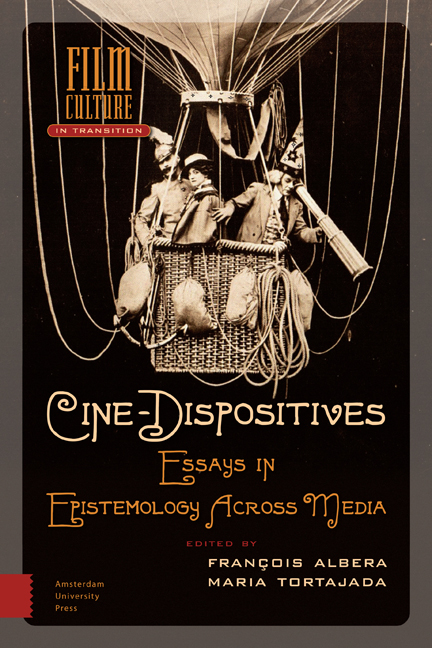“You Do Not Even Know Where You Are”: Dispositive and Dizziness
Published online by Cambridge University Press: 10 February 2021
Summary
The countless efflorescences of more or less recent uses of the word “dispositif” fall into areas as diverse as law, diplomacy, the art of warfare, sociology, plastic arts, literary criticism, film theory (obviously), and many others. Being careful not to venture in every direction, here I will limit my own use of the term to two meanings: first, the standard usage of “a set of elements arranged with a view to a specific goal,” to quote a definition from Tresor de la langue francaise; spectacular dispositives in this instance, more specifically from the late eighteenth century and the early nineteenth century, a time that seems like the beginning of so many things, with so many relations surfacing between them. Second, in a return of sorts to Foucault – if I may put it that way – I will address the issue of whether or not what I set out to describe may be considered a dispositif in his sense of the term, that is, whether or not the concept of “dispositif,” which by every indication remains current, may be instrumental in the intelligibility of this ensemble, and under which conditions.
By spectacular, I do not mean “what pertains to the arts of spectacle or at least, I do not only mean this.” Like the Latin word spectaculum, spectacle involves both a general and a more specialized meaning here: first, that of a “set of things that attract the look” and, as early as the thirteenth century and especially from the Renaissance on, that of “entertainment presented to the public.” According to the Dictionnaire de Trévoux, spectacle thus refers to “an extraordinary object that attracts looks, arrests vision, and which one considers with some emotion,” as well as “public performances […], particularly theatrical performances.”
A spectacular dispositive may accordingly be regarded as an arrangement that draws, orients, guides and informs the look. It may be a theater, of course – notably in the broad sense of this word in the eighteenth century – but it may also consist of a layout in a garden, a mirror such as the Claude glass used by painters and walkers in the eighteenth century, or even a prescriptive description.
- Type
- Chapter
- Information
- Cine-DispositivesEssays in Epistemology Across Media, pp. 75 - 92Publisher: Amsterdam University PressPrint publication year: 2015



